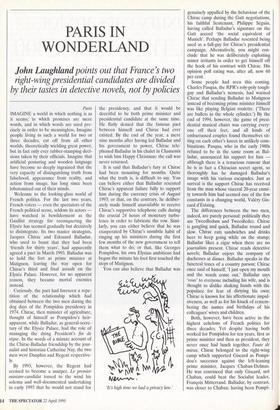PARIS IN WONDERLAND
John Laughland points out that France's two
right-wing presidential candidates are divided by their tastes in detective novels, not by policies
Welcome to the looking-glass world of French politics. For the last two years, French voters — even the spectators of the French political scene, seldom its actors have watched in bewilderment as the Gaullist strategy for reconquering the Elysee has seemed gradually but decisively to disintegrate. Its two master strategists, Jacques Chirac and Edouard Balladur, who used to boast that they had been `friends for thirty years', had apparently agreed a pact in March 1993. Balladur was to hold the fort as prime minister at Matignon, leaving the way open for Chirac's third and final assault on the Elysee Palace. However, for no apparent reason, they became mortal enemies instead.
Curiously, the pact had foreseen a repe- tition of the relationship which had obtained between the two men during the dog days of the Pompidou presidency in 1974. Chirac, then minister of agriculture, thought of himself as Pompidou's heir- apparent, while Balladur, as general-secre- tary of the Elysee Palace, had the role of managing the dying President's fin de regne. In the words of a minute account of the Chirac-Balladur friendship by the jour- nalist and historian Catherine Nay, the two men were Dauphin and Regent respective- ly.
By 1993, however, the Regent had seemed to become a usurper. Le premier ministre-candidat tossed to the wind his solemn and well-documented undertaking in early 1993 that he would not stand for
the presidency, and that it would be deceitful to be both prime minister and presidential candidate at the same time. He flatly denied that the famous pact between himself and Chirac had ever existed. By the end of the year, a mere nine months after having led Balladur and his government to power, Chirac tele- phoned Balladur in his chalet in Chamonix to wish him Happy Christmas: the call was never returned.
It is said that Balladur's fury at Chirac had been mounting for months. Quite what the truth is, is difficult to say. You can believe either that Balladur resented Chirac's apparent failure fully to support him during the currency crisis of August 1993; or that, on the contrary, he deliber- ately made himself unavailable to receive Chirac's supportive telephone calls during the crucial 24 hours of monetary turbu- lence in order to fabricate the row. Simi- larly, you can either believe that he was exasperated by Chirac's unsubtle habit of ringing up his ministers during the first few months of the new government to tell them what to do; or that, like Georges Pompidou, his own Elysian ambitions had begun the minute his foot first touched the steps of Matignon.
You can also believe that Balladur was `It's high time we had a privacy law.' genuinely appalled by the,behaviour of the Chirac camp during the Gatt negotiations, his faithful lieutenant, Philippe Seguin, having called Balladur's signature on the Gatt accord 'the social equivalent of Munich'. Perhaps Balladur resented being used as a fall-guy for Chirac's presidential campaign. Alternatively, you might con- clude that he was deliberately exploiting minor irritants in order to get himself off the hook of his contract with Chirac. His opinion poll rating was, after all, now 60 per cent.
Some people had seen this coming. Charles Pasqua, the RPR's roly-poly tough- guy and Balladur's nemesis, had warned Chirac that sending Balladur to Matignon instead of becoming prime minister himself was like playing Belgian roulette. (`There are bullets in the whole cylinder.') By the end of 1994, however, the game of presi- dential musical chairs was carrying every- one off their feet, and all kinds of embarrassed couples found themselves sit- ting on each other's knees in unlikely com- binations. Pasqua, who in the early 1980s refused to be in the same room as Bal- ladur, announced his support for him although there is a tenacious rumour that he is in fact a Chiracian secret agent, so thoroughly has he damaged Balladur's image with his various escapades. Just as surreal is the support Chirac has received from the man whose visceral 20-year enmi- ty towards him had seemed one of the few constants in a changing world, Valery Gis- card d'Estaing.
The differences between the two men, indeed, are purely personal: politically they are Tweedledum and Tweedledee. Chirac is gangling and quick, Balladur round and slow. Chirac eats sandwiches and drinks beer to keep going while on the stump; Balladur likes a cigar when there are no journalists present. Chirac reads detective novels; Balladur enjoys the company of duchesses at dinner. Balladur speaks in the funereal tones of a country parson; Chirac once said of himself, 'I just open my mouth and the words come out.' Balladur says `vous' to everyone including his wife, and is thought to dislike shaking hands with the populace for fear of dirtying his own; Chirac is known for his affectionate impul- siveness, as well as for his knack of remem- bering the names and birthdays of his colleagues' wives and children.
Both, however, have been active in the highest echelons of French politics for three decades. Yet despite having both worked for Pompidou for ten years, first as prime minister and then as president, they never once had lunch together. Faute de mieux, Chirac belonged to the right-wing camp which supported Giscard as Pompi- dou's successor against the left-leaning prime minister, Jacques Chaban-Delmas. He was convinced that only Giscard, not Chaban, could beat the Socialist leader, Francois Mitterrand. Balladur, by contrast, was closer to Chaban: having been Pompi- dou's social affairs adviser at Matignon, he admired his own successor in that job, a civil servant with a Catholic trades union background by the name of Jacques Delors.
Similarly, the events of May 1968 had moulded the personality of each man in opposite ways. Left in the eye of the storm by de Gaulle's extraordinary flight to Ger- many at the height of the riots, Balladur suddenly understood that the seemingly impregnable French state was in reality a Potemkin village. The experience of star- ing into the abyss left him with a hatred for all forms of direct confrontation. To this day, Balladur, born in Smyrna, governs like an Ottoman vizer, conjuring the numerous conflicts of his fractious subjects away into apparent compromise. Chirac, by contrast, whose political style resembles the behaviour of an adolescent with a new boat, thought 1968 'a positive event in our history'.
Chirac did not begin to discover the virtues of Balladurian emollience until 1979. Having broken with Giscard in 1976, he had shot himself in the foot with a hys- terical-sounding attack against Giscard's European policy, delivered rather incon- gruously from a hospital bed. Realising his mistake, he decided henceforth to try to adopt a less radical image. And yet, although he asked for Balladur's co-opera- tion and advice, he did not heed it at first. Balladur warned him against standing for president against Giscard in 1981, arguing that he had no chance of success anyway, and that if he did stand he would be blamed for the Right's defeat. Chirac ignored him, and Mitterrand was elected.
Balladur continued to make compromise his stock in trade. In 1983, he invented the concept of 'cohabitation' between a right- wing government and the new Socialist president. His influence over Chirac grew, especially as he was a bridge between the two right-wing parties: not being a member of the RPR himself, he had wide support within the UDF. By 1986 he had convinced Chirac to agree to become Mitterrand's prime minister. The cohabitation, howev- er, was a disaster. A student beaten to death by police during a demonstration against educational reform; the stock exchange crash of October 1987 following the privatisation spree; the government's attack on such sacred cows as punitive tax- ation for the rich; the prime minister's excessively radical and ambitious image the script could have been written by the Olympian president himself, who slipped easily into the role of protector of the French against the wicked abuses of the Right.
Even though his role in the government had been immensely powerful as finance minister, Balladur had insisted in vain that the election could be won on the centre ground and not on the right. He was now more convinced than ever that he could manage the next cohabitation better him- self and not be trapped by Mitterrand. `Let us eliminate everything which divides us,' he used to say, convinced that the Right's divisions were a fatal weakness. He set about preparing himself for Matignon with the utmost fastidiousness; and when his number came up in the spring of 1993, no one was in the least surprised.
The subsequent collapse in relations between him and Chirac has none of the high drama of the break-down of relations between, say, Margaret Thatcher and Geoffrey Howe. Whereas genuine issues of state came to divide those former friends, the ever-shifting balance of power among the super-barons of the French Right resembles nothing so much as the large-bottomed hippopotami weaving in and out of various combinations in the `Dance of the Veils' in Fantasia. It is merely a question of who's in and who's out.
Indeed the ultimate paradox is that far from collapsing, the Gaullist strategy might 'have worked after all. While there may not actually have been a pact between • Balladur and Chirac that both men would stand for the presidency, as one commen- tator has recently speculated, nevertheless the logic of the situation operates in a dialectical fashion, according to which apparent opposites can in fact work for the same end. Having two right-wing can- didates may have transformed the Right's traditional fractiousness into a strength, for it gives the electorate the impression that the Right is diffuse, allowing it therefore to attract the widest possible support. Both candidates are already extremely politically ambiguous on their own — Balladur appears more centrist, but is friendlier to the National Front; while Chirac pretends to be more demagogic and hard-line, but also attracts considerable left-wing support. If ambiguity is good for one candidate, it is surely twice as good for the Right as a whole with two.
For whichever of the two Gaullists wins on Sunday, he will be supported by the other against the Socialist candidate in a magnificent display of reconciliation in the second round, and will thereby collect his votes. If there is a Balladur-Chirac run-off, then the reconciliation will just take place' two weeks later, for the victorious candi- date will obviously include members of the `enemy camp' in his future government. The apparently splintered Right will be put together again, and will proudly govern with apparent new-fbund unity. Most arresting of all is that, in this world which cares not a fig for principle or truth, both the theory of the dispute and the theory of the clever ruse can be as true or as false as you like, and the quarrel between Balladur and Chirac can mean just what you choose it to mean. The question is which is to be master — that's all.



























































 Previous page
Previous page